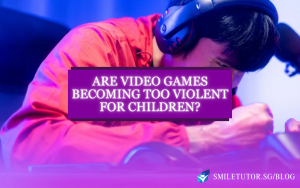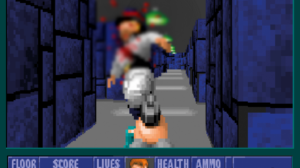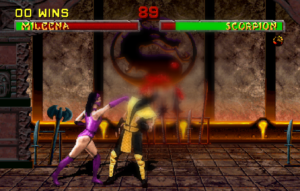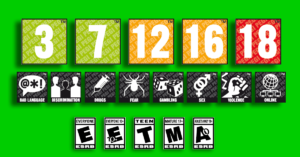
Gunshots. Loud blaring sounds of explosions and screaming. Expletives filling the living room.
As a parent, you get drawn into the commotion. Taking a slight peek into a child’s bedroom, you look on with concern.
Little Timmy is staring at the screen intently, gripping his mouse tightly as his fingers run through the keyboard in a furious craze. Is that really the soft-spoken boy you know? It’s like you’re seeing a different person! He doesn’t even notice that you’ve entered the room. Focused, his eyes dart around wildly as the video game character he’s controlling pulls out a shotgun.
BANG! The approaching monster turns into a puddle of organ matter before your eyes.
This doesn’t seem appropriate, you think. And so you yell: “Timmy! What do you think you are playing?! No more video games for a month!”
That’s about how far parents would go when approaching a situation like this. Some are okay with giving their children some personal time and space.
But there are also an equal number of parents who practise extreme caution towards the exposure of graphic and sensitive information in games.
“Violence in video games will likely turn my child violent too.” How much truth is there in this sentence? Today we’re here to talk about it!
Mainstream Perception of Video Games

[Wolfenstein 3D]
Mario, Pokémon, Minecraft.
Gaming has springboarded into mainstream relevance over the past few years– Video games have grown from a niche hobby for young people like our children, into a multi-million-dollar industry permeating into part of people’s daily lifestyles.
This resurgence has raised attention and an inevitable level of scrutiny towards its effects on our youths today.
While many argue that video games merely exist as one of many forms of entertainment and have no impact on real-life violence, others believe that exposure to violent content can lead to aggressive behaviour.
Who is right, who is wrong?
We’ll explore both sides of the debate and try to answer the question, “Are video games becoming too violent?”
Case Study: The “Mortal Kombat” Series

[Mortal Kombat X]
Where else better to look than “beat-em-up” games on the topic of video game violence?
Primal, adrenaline-packed and gratifying.
While the earliest video games were relatively simple and posed no real threat of violence, game developers began to incorporate more brutal elements into their creations over time. In pursuit of the excitement from the more realistic takes on combat, many titles were born under the genre.
The only video game franchise to stand out by a large margin was undoubtedly the “Mortal Kombat” Series. Mortal Kombat is one of the first video game franchises to incorporate gratuitous violence and gore into gameplay. With a storied history depicting brutality and bloodshed for over thirty years, the game is known by many who revel in the catharsis of its gameplay.
Since the franchise’s first entry in 1992, Mortal Kombat has pushed the boundaries of acceptable content in popular culture with each subsequent release.
The original Mortal Kombat, released in arcades and on home consoles in the ’90s, featured lifelike graphics and digitised character sprites.

Players could choose from a cast of fighters, each with their own signature moves and “Fatalities” – finishing moves that resulted in the gruesome death of the defeated opponent.
That was absolutely unheard of at the time.
The game’s mechanics horrified parents and lawmakers, leading to widespread controversy and even Congressional hearings.
Despite the backlash, Mortal Kombat remained a popular title as it upped the ante; Mortal Kombat II introduced new fatalities, including decapitations, while Mortal Kombat 3 embraced its identity by introducing “Babality” amongst many variants of its now iconic move.
Imagine turning your defeated opponent into a crying infant.
Babalities were graphic in their own way.
Subsequent Mortal Kombat games have continued to push the envelope concerning violence. But over time, they’ve learnt to balance gore with more nuanced storytelling and character development.
For example, 2015’s Mortal Kombat X featured a story mode that spanned 25 years in the franchise’s timeline, and its characters had unique personalities and motivations that went beyond simply being instruments of violence.
Till this day, the relevance of this hyper-violent franchise can be seen to be a polarising success story for many, as it continues to stir the boundaries of what is acceptable or morally degrading to society.
Public Perception of Violence in Video Games

[iStock / MTStock Studio]
There has been a long-standing debate over whether video games that depict violence lead to increased aggression and violent behaviour in individuals, especially in young children.
A study published in 2015 by the American Psychological Association (APA) found that playing violent video games can lead to an increase in aggressive behaviour and thoughts.
On the flip side, another study published in the Journal of Communication countered by claiming that while violent games may increase short-term aggression, no long-term effects were actually observed.
Since then, the APA study has been referenced countless times with differing opinions by professionals over the years.
Physical incidents have also been related to the games’ influence on multiple occasions; In the wake of the infamous Columbine school shooting in the US, there was a widespread belief that the shooters had been influenced by playing violent video games.
In response, many politicians and public figures called for stricter regulations on the sale of violent games to minors. In 2018, after the Parkland school shooting, President Trump called out violent video games as a contributing factor to the rise in mass shootings in America.
Influencers Speaking Out About Violence in Video Games

[Getty Images]
Other public figures have spoken out about the impact of violent games on individuals.
Video game designer Hideo Kojima, known for creating the hit title Metal Gear Solid, has argued that games can provide an outlet for individuals to safely express their aggressive tendencies.
“When you hit someone or inflict pain, faces get disfigured for example, and I want to make games that show that sort of thing. If you don’t see the pain, you can’t understand what you’ve done, and you’ll pass through battles without taking responsibility for your actions. I don’t want to ignore that. I want players to think, even if it’s just a little, about what violence and war are.” Kojima states.
Meanwhile, the “lightning rod for controversy” Jordan Peterson does not shy away from his take on the topic. The author cum psychologist countered that the over-exposure to violence that occurs through playing violent games can lead to a younger crowd becoming desensitised. These children would become less capable of empathising with others.
“It is far more likely that kids with a propensity for violence at (say), age two, are unlikely to mature out of that propensity if their salutary play with other children is constantly disrupted by the presence of screens.” Jordan summarises.
Regardless, caretakers of children maintain a general sentiment of caution. When there’s smoke, there’s fire— From first-person shooters to gory fighting games, many titles are pushing the boundaries of what’s acceptable.
Because of the increasing exposure to video games at an early age, parents and critics are understandably worried for their young gamers.
Preventions & Regulations Against Violence in Video Games

[iStock/SunnyVMD]
Parents are understandably worried.
We want our children to enjoy games without restricting their freedom too much, but we don’t want to overdo it either and risk over-exposure.
How can we protect our children while striking that fine balance?
Well first, let’s begin by proactively monitoring the gaming content that our children are allowed to consume.
This can be done through parental control settings on game consoles and online gaming platforms, as mandated by law. These controls can limit access to games that have violent or explicit content.
The 3 parental controls below can be tuned based on age ratings or reviews so that children are not subject to unknown material not suitable for them.
1) Age Ratings

There are various age-rating systems worldwide, but they all serve the same purpose of identifying content suitability across different age brackets.
You can easily identify what is suitable straight from the game cover!
2) Game Reviews
The reviews for a game are usually telltale signs that attributes the nature of the game. Additionally, critics sometimes provide video material and cover their walkthrough of the game, giving you more clarity into your decision.
3) Test-First Approach
Some gaming platforms allow you to trial the game before their children play it, so that you can experience the game yourself and become more involved in the process.
You’ve played through the first few hours of a seemingly innocent game. The reviews are good.
Why not give it a pass?
Government Regulations
In many countries, governments regulate the entertainment industry to help protect young people. In some regions, the governments have strict regulations in place to prevent the access of young people to inappropriate material such as violent video games.
In contrast, others have self-regulated with industry bodies and recognized organisations like PEGI, ESRB. There have been legal precedents set where game developers have been forced to change or remove content following public outcry or legal action.
The game “Manhunt 2” had its initial release rejected by the British Board of Film Classification due to its extreme violence. Its content was later altered to receive a lower rating, allowing it to be released in the UK.
Future of Gaming: Alternatives & Moving Forward

[Pexels]
As technology advances and virtual reality becomes more prevalent, it has become more essential than ever for the industry to prioritise the digital safety and well-being of its young audience.
The video game industry needs to keep a close eye on the production of violent content in consideration of our children. Game developers should step up and find more safeguards around violent concepts, so that age ratings can remain consistent and up-to-date.
In the meantime, parents should also take up an active role in monitoring their children’s gaming habits and moderate their engagement, so that a healthy lifestyle of work and entertainment is maintained.
We may not expect game makers to shift away from violent themes as they continue to enjoy mainstream success for the foreseeable future.
However it is also imperative that we continue to pass down public awareness towards the known dangers of prolonged exposure towards violence, no matter the medium.
To read more about this topic, check out a few of our related articles below.
READ NEXT:
Top 5 Educational Games for Children
4 Super-Fun Online Games You Can Play For Free With Your Friends
